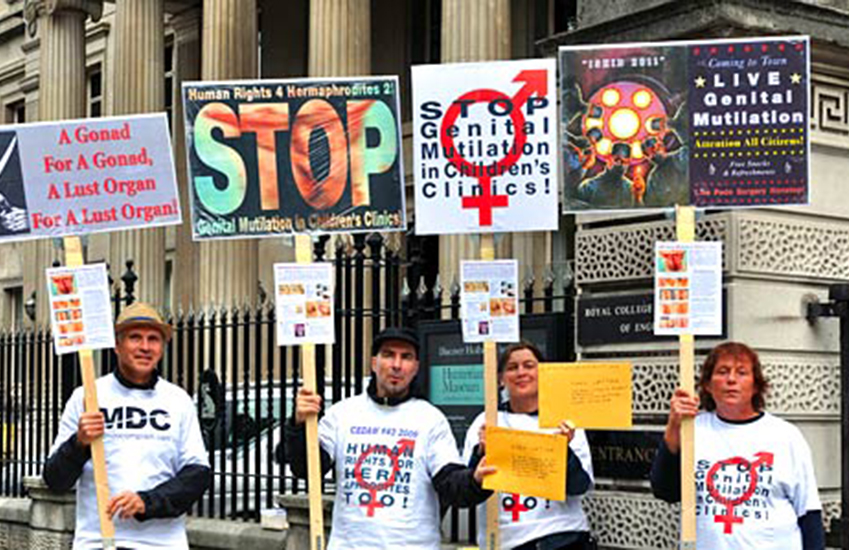StopIGM.org
Protest against intersex genital mutilation outside London’s Royal College of Surgeons in 2011.
People been celebrating the World Health Organization’s (WHO) decision to remove gender dysphoria from its list of mental disorders. But not everyone can celebrate as much as others.
Now known as gender incongruence, the WHO announced its decision in the 11th version of its International Classification of Diseases (ICD-11).
Trans advocates in United States said the decision might impact on health insurance. The intersex community are unhappy they are still ‘pathologized and called disordered’.
The intersex community
Intersex advocacy organization OII Europe welcomed the ‘positives changes that the ICD-11 makes in regards to trans people’. Intersex is an umbrella term for people born with a body that does not meet the societal expectation of male or female.
OII Europe’s executive director, Dan Christian Ghattas, said it was ‘an important and overdue step’.
‘However we are very concerned that WHO has let the chance pass to depathologise intersex people and hence to work towards decreasing human rights violations intersex people face in medical settings,’ he said in a statement.
Since 2009 the United Nations Human Rights Treaty Bodies have called on Member States to stop human rights violations of intersex people more than 30 times.
Still many intersex people are subjected to invasive and irreversible surgeries on the basis of having a ‘so-called malformation or disorder’. In most cases these interventions are not wished for by the intersex person themselves. In the case of infants and children most of them are deferrable until the person could make an informed decision.
‘We are speechless that WHO seems not to take into account international human rights bodies’ position and not even their own opinion,’ said Miriam van der Have, Co-Chair of OII Europe.
‘WHO has stated in two majors publications that so-called sex normalizing procedures are often undertaken to make intersex infants and children conform to gendered physical norms. Diagnosing a person with a variation of sex characteristics as ‘malformed’ or ‘disordered’ feeds immensely into this malpractice.’
‘But it does not end there’, according to Kitty Anderson, Co-Chair of OII Europe.
‘The ICD-11 establishes a new diagnosis, called ‘Gender incongruence of childhood’, which has been strongly opposed by trans and intersex experts alike,’ Anderson said.
‘For intersex children ‘normalizing’ procedures are frequently justified by the ‘imperative’ of creating bodily congruence – for example, by removing ‘incongruent’ organs or making them ‘congruent’ with stereotypical male and female anatomies.
‘We are very concerned about the practices that may evolve on the basis of this diagnose.’
Trans in America
When Tanith Broom heard about the reclassification in the ICD 11, they felt dread.
Broom is the co-founder of TransChance Healthcare, an organization that aims to create, maintain, and share resources that educate and empower the trans community in health care spaces.
They said the reclassification was a ‘huge victory for trans people worldwide’. They also said that it ‘likely won’t bode well for trans people in the US under the Trump administration’.
‘Gender dysphoria as a mental health diagnosis has been a secret weapon in the arsenal to obtain gender affirming care in the US since the passage of the Mental Health Parity and Addiction Equity Act in 2008 and it’s expansion to include individual plans and to mandate coverage for MH disorders by all insurers in the Addiction Affordable Care Act through the Parity Clause in 2010,’ Broom told Gay Star News.
‘Those laws basically say that services considered standards of care for mental health diagnoses have to be covered.’
Broom said insurance companies already exploit many trans people’s lack of knowledge about healthcare laws to formally ‘exclude’ coverage for various treatments.
Though ICD-11 rollout won’t happen in the US until 2025. But Broom anticipates insurance companies will try to use this ‘as yet another justification for denying care’.
Broom wants trans protections and requirements for gender affirmation care brought to the state level.
But it’s also more important than ever for trans people to educate themselves. They must learn about health insurance, laws, and policies along with their patient rights.
‘There are health advocates and organizations like ours (TransChance Health) all across the US that can help guide patients through the healthcare system, deal with insurance denials and appeals, educate patients on the process, and help lobby for expanding protections,’ they said.
‘It’s not time to feel hopeless – this is a time to fight.’






